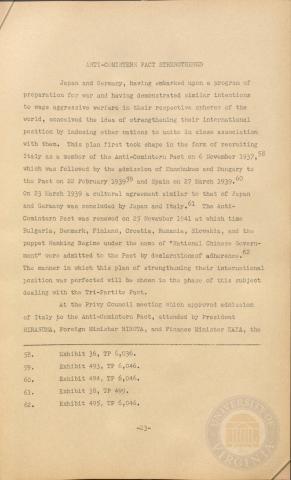
Page 23
| Parent | Japanese - German - Italian Collaboration |
|---|---|
| Date | |
| Language | English |
| Collection | Tavenner Papers & IMTFE Official Records |
| Box | Box 14 |
| Folder | Japan, Germany, Italy Collaboration and Introduction |
| Repository | University of Virginia Law Library |
ANTI-COMINTERN PACT STRENGTHENED
Japan and Germany, having embarked upon a program of preparation for war and having demonstrated similar intentions to wage aggressive warfare in their respective spheres of the world, conceived the idea of strengthening their international position by inducing other nations to unite in close association with them. This plan first took shape in the form of recruiting Italy as a member of the Anti-Comintern Pact on 6 November 1937, which was followed by the admission of Manehukuo and Hungary to the Pact on 22 February 1939^ and Spain on 27 March 1939*60 On 23 March 1939 a cultural agreement similar to that of Japan and Germany was concluded by Japan and Italy The Anti- Comintern Pact was renewed on 25 November 1941 at which time Bulgaria, Denmark, Finland, Croatia, Rumania, Slovakia, and the puppet Nanking Regime under the name of "National Chinese Govern** ment" were admitted to the Pact by declarations of adherence. The manner in which this plan of strengthening their international position was perfected will be shown in the phase of this subject dealing with the Tri-Partite Pact.
At the Privy Council meeting which approved admission of Italy to the Anti-Comintern Pact, attended by President HIRANUMA, Foreign Minister HIROTA, and Finance Minister KAYA, the
58. Exhibit 36, TB 6,036
59. Exhibit 493, TP 6,046
60. Exhibit 494, TP 6,046
61. Exhibit 38, 499
62. Exhibit 495, TP 6,046
